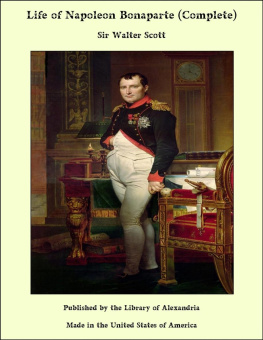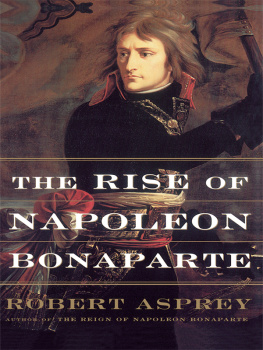

This edition is published by PICKLE PARTNERS PUBLISHINGwww.pp-publishing.com
To join our mailing list for new titles or for issues with our bookspicklepublishing@gmail.com
Or on Facebook
Text originally published in 1955 under the same title.
Pickle Partners Publishing 2016, all rights reserved. No part of this publication may be reproduced, stored in a retrieval system or transmitted by any means, electrical, mechanical or otherwise without the written permission of the copyright holder.
Publishers Note
Although in most cases we have retained the Authors original spelling and grammar to authentically reproduce the work of the Author and the original intent of such material, some additional notes and clarifications have been added for the modern readers benefit.
We have also made every effort to include all maps and illustrations of the original edition the limitations of formatting do not allow of including larger maps, we will upload as many of these maps as possible.
THE MIND OF NAPOLEON
A Selection from His Written and Spoken Words
Edited and Translated by
J. CHRISTOPHER HEROLD

TABLE OF CONTENTS
Contents
PREFACE
THIS IS NOT a source book, not a collection of documents. It is a selection of written and spoken utterances on a variety of subjects, grouped according to broad themes and designed to give the reader an insight into the mind of a man who combined energy of thought and energy of action to an exceptional degree.
Since Napoleon felt no urge to expound his thought systematically, this book is made up of many fragments, some of them contradictory. I have attempted to show in my Introduction that despite such fragmentation and contradictions there exists in Napoleons thought a unifying pattern. In the book itself, however, I have refrained from editorial comment, which might easily seem to establish links and relationships where perhaps none exist. A few explanatory remarks were necessary here and there, but generally I included only such selections as can be readily understood without specialized knowledge or tedious explanations.
Whether or not Napoleon seriously intended to invade England, or how he hoped to ruin her economy by the Continental System, or how he organized his armies, or who should be given credit for his victory at Marengothese are interesting questions, but they lie in the historians domain and they are not exactly uppermost in the minds of non-specialists. The figure of Napoleon himself, on the other hand, his thoughts on men, society, government, religion, war, politics, art, science, history, and himselfthese are topics of undiminished significance and interest in our own time, and they are among those included in this book. A less inclusive volume would lack balance; if more inclusive, it would defeat one of its chief purposes, which is to hold the interest and stimulate the thought of the intelligent but non-specialized reader.
As for the historian, he will find no new facts, but if he hopes to gain some fresh glimpse of Napoleons mind and thought, he will perhaps be rewarded to some degree. He may, of course, have read all the sources on which this volume is basedbut then, he may have read them for a purpose other than that of culling Napoleons thoughts, and at any rate the abundance of the material is such that many links as well as contradictions probably escaped his attention. Or else he may be familiar with one or several of the similar collections that have appeared from time to time in the past century and a quarter. But these collections generally had ulterior motivesusually to glorify Napoleon and the memory of his Empireand they were, in any case, addressed to the nineteenth-century public, whose perspective differed not a little from ours. More recent compilations frequently are refurbished versions of the older ones. None displays a serious attempt at an organic presentation of its material, and none utilizes as great a variety of sources as does this one. Such assertions may sound obnoxiously self-assured, but if I could not make them in good faith I would not publish this book. Moreover, no competing work is now in print in English. The one English work which the present selection duplicates to any appreciable extent is Napoleons Letters, edited and translated by J. M. Thompson and published in Everymans Library (Dutton, 1954). There is, of course, no duplication whatever of plan and purpose, and thus it requires no chivalry on my part to recommend Mr. Thompsons excellent selection.
The topical organization I chose to adopt requires no justification. Others would have done things differently. Even the decision whether to include a quotation under one heading rather than another is an individual and personal one. Certain topicssuch as religionwere considered by Napoleon from so many angles that they had to be treated under several more general heads. A more lexicographic type of arrangement seemed to me artificial and mechanical as well as boring.
The physical presentation of the volume requires a word of explanation. The book is divided into thirteen general themes; these are divided into subsidiary sections, which in turn are subdivided, for the sake of logical continuity, into sets of one or more quotations. The sets are numbered consecutively from 1 to 340, and the source of each quotation is given under the corresponding numbers in the Sources and Notes at the end of the book. Chronological sequence has been observed only within each of these numbered sets, and even there a few minor exceptions occur. However, the date of each quotation is indicated, either in brackets or in an introductory sentence, along with such other information as seemed pertinentwhether the source is a letter or a conversation, and the like. Some additional information may be found in the Notes. As a rule, uniform consistency has been sacrificed to brevity; where the exact date of an utterance or the name of the recipient of a letter seemed informative, they were given; where not, they were omitted. A brief chronology of the main events in Napoleons career and biographical notes have been placed at the back of the book for the readers convenience.
The sources used fall into three categories: (1) Napoleons writings, including autograph manuscripts and dictations of letters, orders, decisions, bulletins, proclamations, newspaper articles, memoirs, commentaries, etc.; (2) Napoleons oral opinions as given at the Conseil d'tat, including stenographic transcripts, official minutes, and unofficial notes taken by various councilors; (3) recorded conversations and reminiscences of Napoleons contemporaries from about 1800 to 1821. The conversations are, of course, of unequal reliability, but an attempt has been made to select only those which seemed reasonably plausible or which are corroborated in other sources.
The translation is entirely my own. Several of the quotations, however, are transcribed from sources originally published in English, notably those from Dr. OMeara, one of the Evangelists of Saint Helena. His awkward prose, interlarded with Italian and French, is English in name only; I took a few liberties in transcribing it.
I wish to thank the Librairie Plon for extending permission to use several passages from Mmoires du gnral Caulaincourt, first published in 1933. These passages appear under Nos. 59, 75, 121, 205, 226, 231, 245, 254, 259, 265, 319, 322, and 335.
Next page















